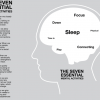Could it be low blood sugar?
Initially, when one’s blood sugar drops too low, the brain is not getting the energy it needs, and the result is a feeling of serious fatigue, along with irritability and emotional swings due to the release of adrenal hormones.
Those suffering from hypoglycemia experience a roller coaster effect as their blood sugar bounces from low to high to low again, with multiple episodes throughout the day. Personally, I feel energized and lively in the waking hours of the morning but at around 10am I start to crash and by 3pm I feel beyond fatigued. My joints ache, my muscles hurt, I’m irritable and I can not even walk up stairs, let alone pick up a box. It’s just this overall fatigue, it’s debilitating. It causes brain fog, makes me extremely spacey and seems to increase cortisol secretion. Because of this I'm always in a state of fight or flight, even with people I usually feel comfortable with. It's like everything is overstimulating and triggers my brain to panic. All I want to do is space out and fall asleep because the burden of thought to accomplish a task is too tiresome and stressful.
I’m dying here and it’s having a detrimental impact on my daily tasks. Short-term emergency remedy that increases blood sugar is not an option, unless its natural. Most people tell me to drink a mountain dew or pepsi. No way.
Diet wise, I started a high fat, low carb diet a couple of weeks ago and my anxiety has significantly increased. In December, I ate a high carb, high fat diet with lots of pasta and I felt great, the problem is wheat flares my psoriasis, which is one of the reasons why I cut out wheat. Honestly, I felt better eating Taco Bell every other day than I do know.
I've learned that cortisol is necessary for gluconeogenesis, gluconeogenesis is required for survival on low-carb, chronic cortisol is known to be damaging, and cortisol is known to screw with sleep. My sleep as of recent has been absolutely horrid. I wake up multiple times a night, toss and turn and feel lethargic and spacey upon waking. This could also explain cortisol spikes throughout the day. This never happened when I was eating grains.
Lastly, when I drink a fruit/veggie drink during the afternoon hours my mood increases significantly and my anxiety lessens to a noticeable degree. Should I go back to a high carb diet? I can't stand living in a state of fight or flight, only carbs rid of this burden.















































